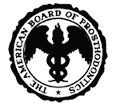Northern Virginia Prosthodontist
Nova Premier Dental, Dr. Peterson Huang in Falls Church (Northern Virginia) is a dual Board Certified Prosthodontist. Expert in implant dentistry, oral reconstruction, TMJ issues and dentures.
Call (703) 532 – 7586 for a consultation
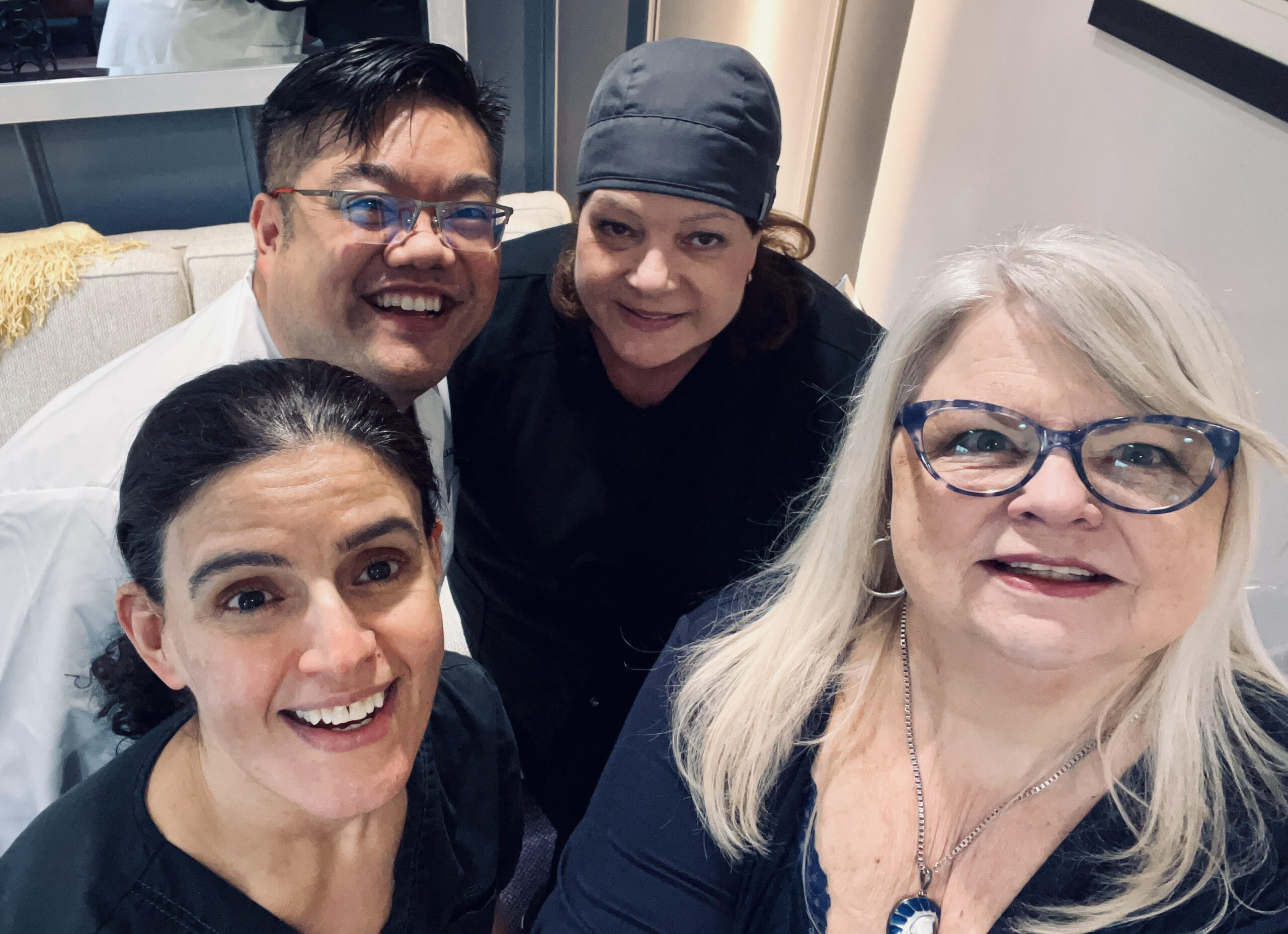
Dr Huang and his team
How is a Prosthodontist different from a general dentist or other dental professionals?
The root “prostho” means to replace, and in this case, to replace with prosthetics. Prosthodontists are THE recognized experts you can trust for your oral-prosthetic needs. Severe decay, cancer, or an accident can each be a cause for needing a replacement tooth or teeth.
Why see a BOARD certified prosthdoontist?
A board certified prosthodontist means the specialist, after his additional 3 years of residency, has successfully passed a rigorous examination established by an independent authority (board) for the specialty. Dr. Huang is a dual-certified prosthodontist by the American Board of Prosthodontics and the Royal College of Dentists of Canada.
Prosthetic dentistry, or prosthodontics, falls into two categories: fixed prosthetics and removable prosthetics. The fixed type are cemented and/or screwed in place so the patient will not have to remove them. Examples of this are dental implant crowns and bridges. Removable types are full dentures and partial dentures to replace missing teeth, that can be removed, for example, before sleeping. Today, most patients prefer fixed prostheses over removable. However, there are still several advantages of removable prostheses such as ease of cleaning, repairing, and refurbishing.
Prosthodontists are dedicated specifically to these types of procedures. Prosthodontists are also considered the “quarterback” of the oral treatment plan. Regularly, they oversee teams of both specialists, and general dentists, while caring for your specific situation and needs..
What does the word prosthodontics mean?
The word prosthodontics originates from “prostho–,” which stands for prosthetics. A prosthetic is an artificial body part; and “—dontics,” which means having to do with teeth. So, in short, prosthodontics is the specialty of dentistry that deals with oral prosthetics.
When might you need to see such a specialist?
As an illustration, a good analogy would be the following: if you required heart surgery, you would seek the attention of a surgeon that specializes in the cardiac procedures, rather than a general surgeon. Equivalently, if you have oral conditions, such as missing teeth or a complex bite that requires precise and detailed work, then you require a dentist who specialized in prosthetics, better known as a prosthodontist. There are many reasons why you might want to see a prosthodontic specialist – call our office to discuss your situation with one of our specialized team.
My general dentist says he does prosthetic dentistry, so why should I see a specialist such as a prosthodontist?
One of the key differences between a general dentist and a prosthodontist is that a prosthodontist is trained to treat the mouth as a whole, rather than a one tooth at a time approach. A prosthodontist also has a depth of knowledge of the jaw joint (or TMJ). An initial evaluation begins with making sure the jaw joint is aligned and functioning correctly. Then, the bite and facial size and shape (vertical dimension) is analyzed. An unequal bite on one side could offset and create muscle spasms leading to pain and tenderness not to mention create bruxism or grinding of the teeth. A collapsed facial dimension could suggest excessive loss of tooth structure from bruxism or other parafunctional habits.
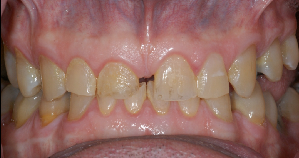
Here is a collapsed bite due to grinding and parafunctional habits. The front teeth are no longer the same size due to the excessive wear on one vs the other. The patient also reports muscle spasms and tenderness
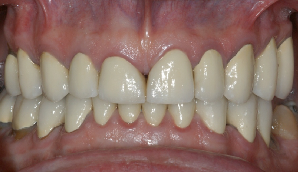
The teeth have now been restored with prosthetic crowns to the correct height and the bite is now in harmony
Treating the mouth as a whole does not negate the detailed examination of each tooth, in fact it enhances it . Each tooth should be evaluated for its supporting bone structure, wear patterns, and fracture lines. This could suggest abnormalities in the bite (also known as the occlusion). Imagine a tooth in your mouth that is out of harmony. It’s like having a pebble in your shoe, constantly hurting your foot until you mal-adapt and start favoring your other foot. Pretty soon, your other foot will begin to have muscle spasms and hurt. That is why each tooth in the mouth must have a bite that is uniform with the other teeth. Furthermore, the back larger teeth are designed to do the chewing, while the smaller front teeth are designed to cut. They work in harmony—premature loss of back teeth will cause excessive forces on the front, causing weakening of their bony support and then mobility.
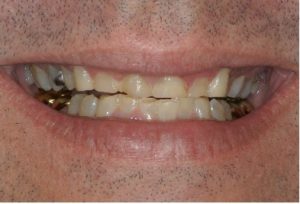
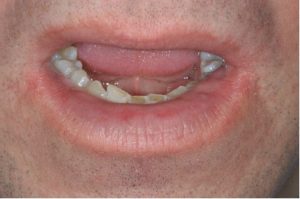
A Patient with abnormal bite issues
A Patient with abnormal wear patterns
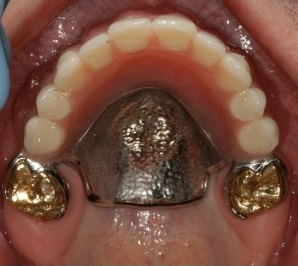
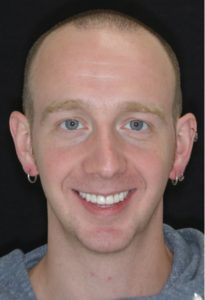
A patient with fixed gold crowns and a removable partial denture. The removable partial denture can be taken out at night to be cleaned, while the fixed gold crowns must be brushed and flossed in place. This is a partial denture that replaces all of the missing front teeth
Having your bite in correct harmony is even more important when you are adding prosthetics, such as crowns, that use dental implant screws as their artificial roots. The bite must be adjusted perfectly, or components such as the screw could loosen, or worse the implant itself may be overloaded and fracture (break)!
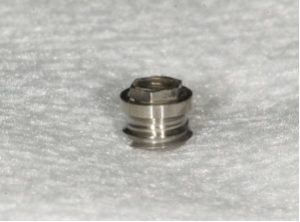
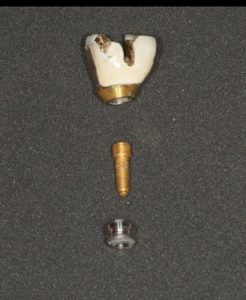
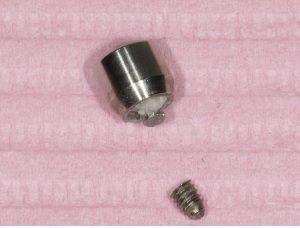
A broken implant and parts, due to improper bite issues
I have been told to see a prosthodontist prior to treating my cancer? Why?
Treating cancer can be very stressful both emotionally and physically to your body not to mention the side effects of chemotherapy and radiation therapy. You will need your body to be properly nourished. The gateway to your body is your mouth. The last thing you want to be worried about is a toothache.
Patients that have been diagnosed with head and neck cancers especially need to see a prosthodontist. A head and neck surgeon may require a surgical obturator to be fabricated and delivered at the time of surgery, especially if part of the roof the mouth is to be removed, leaving a hole to the nasal cavity. Radiation therapy may have severe side effects, such as reducing the amount of saliva and causing difficulty in healing; therefore, a thorough assessment of the teeth must be conducted prior to treatment and teeth with poor prognosis must be extracted with sufficient time to heal before your cancer treatment can start.
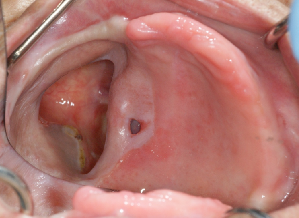
This is a cancer survivor with a surgical defect (hole) in the roof of their mouth
This patient wears a prosthetic obturator which prevents food from going into the nasal cavity (defect or hole, created by the surgery to remove their tumor) and re-establishes correct speech. It can be removed for easy cleaning.
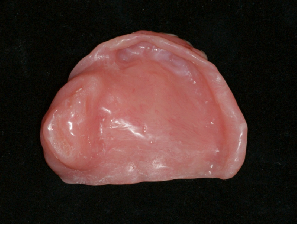
Obturator to fill in the surgical defect on the roof of the mouth
Nova Premier Dental
313 Park Ave #306 Falls Church, VA 22046
(703) 532-7586

